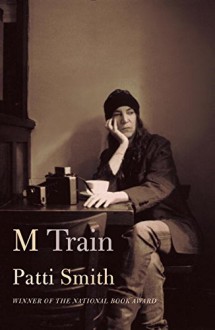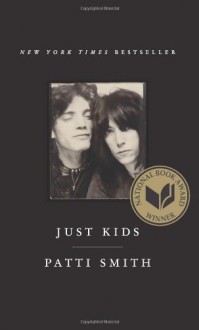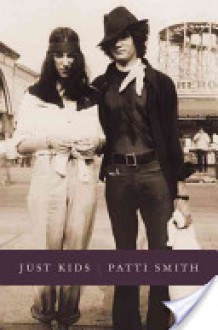
M train, Patti Smith; Author and Narrator
Be prepared for an intense read. I listened to this audio in its entirety, but I must admit, I wanted to quit many times. The author narrates her own book, and her style is a monotone that drones on and on, without any modulation. It feels sad from beginning to end as she takes the reader on her journey following no timeline and no pattern, but randomly jumping from topic to topic, year to year, memory to memory. She examines her dreams, revisits excursions to many places and countries in order to photograph, write poetry, lecture, make music, and write. It reads a bit like a travelogue sometimes, albeit one that contains famous names. There is, midst the gloom of her memories, a sardonic moment and a touch of humor now and again.
In spite of the solemnity of the memoir and lamenting nature of the narration, the straightforward, conversational nature of the reading made me stay on long after I thought I would. I simply felt that the author was speaking directly to me, confiding in me, unleashing her tormented soul, relieving her emotional angst upon my shoulders, so how could I abandon her? I felt like I had been invited to read her diary. Obviously, somehow, in spite of her lack of emotion in the reading, she filled her story with it in the telling, and I connected completely with her, in the end.
It felt almost like a lamentation about the losses she experienced in her life, many of which seemed untimely and unfair. She had a house in New Jersey when Hurricane Sandy hit, a house that by all rights should have been destroyed but stood alone among her neighbors intact, still however, in need of its original list of necessary repairs. The coffee shop she invested in and loved died a premature death. Two loves of her life, her husband and her brother, left her in the prime of their lives. When she visited the home of Frieda Kahlo and Diego Rivera, the trip was marred by her severe migraine. The organization she gave speeches for in Iceland that concerned itself with Arctic expeditions, closed its doors.
All of the mundane happenings of life somehow took on a larger than life meaning for her. She agonized over the ways that travel changed, down to resenting the seat belt requirements on airlines or kiosks used for boarding passes. She traveled to Vera Cruz hoping to get a superb cup of coffee, a drink she adored. She collected odd little pieces of memorabilia that meant so much to her, and yet she often lost the things that meant most to her. She had a compulsion to make lists to keep organized and functioning, but somehow, she was forgetful too and was always leaving something important behind and wondering if it was a message or sign of some kind. She missed her mother and her father. She reminisced about the time she played chess with Bobby Fischer.
So you see, while it was intensely interesting because of the subjects she introduced, it was rambling and somber as well. Most of the time, she seemed to be looking backward, morosely, at the lost loves of her life, without the opposite effort of looking forward, somewhat with joy. She is, and was obviously, a free spirit who missed her husband her other family members. She dwelled upon the illnesses that afflicted them, and even memorialized her own serious childhood illness. At the end, there was the barest hint that she would continue to investigate and participate in new projects, in spite of the heavy cloak of grief that seemed to travel along with her.
So, what is the M train? Is it a train with no fixed destination, traveling down the road of life showing us all the random events we will all someday face, sooner or later? Is it the embodiment of the capriciousness of life? Somehow, in spite of the monotone, in spite of the sorrow and solemnity inhabiting the pages of her memoir, it grabbed my heartstrings and made me think about my own life and lost loves.


 Log in with Facebook
Log in with Facebook 









